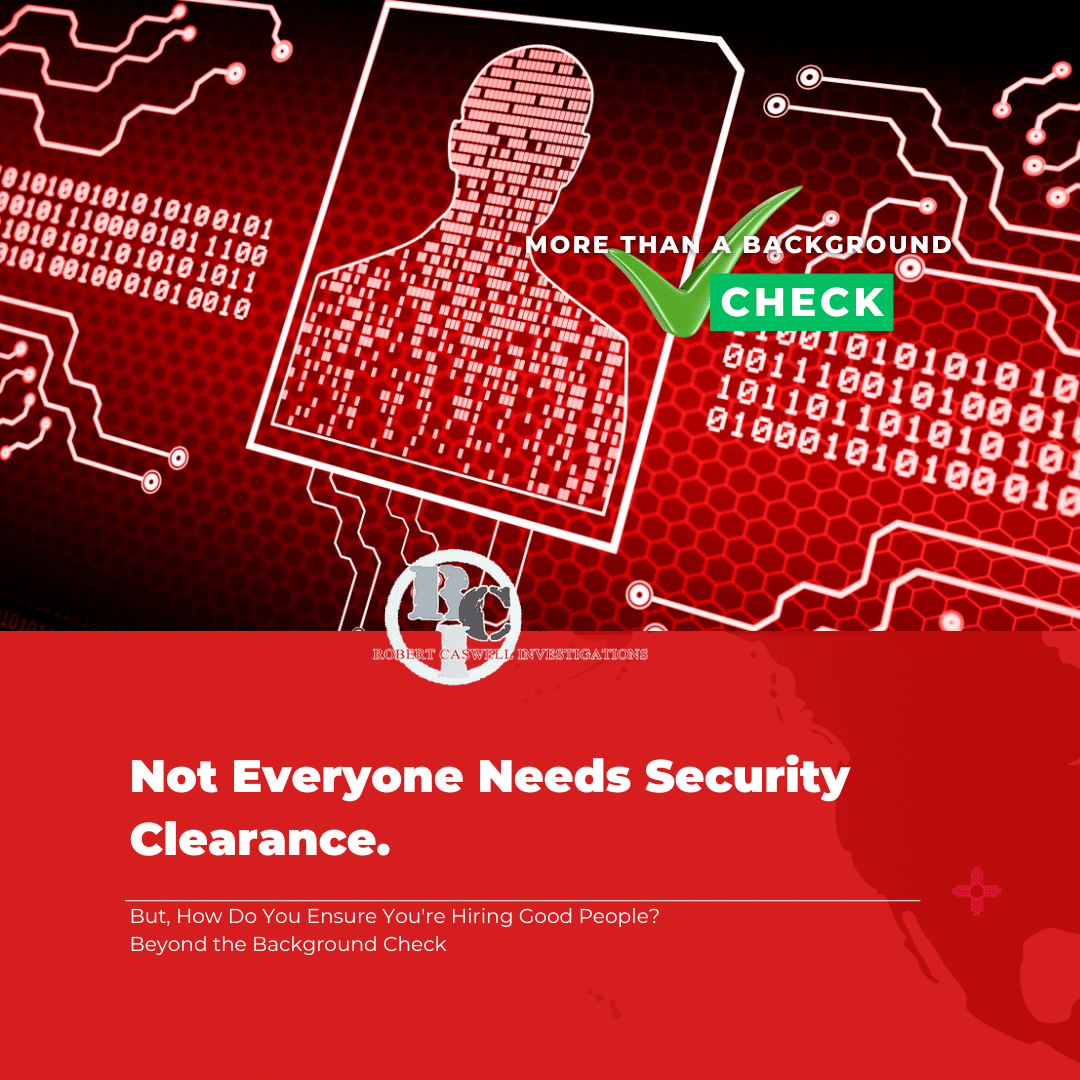
27 Feb Not Everyone Needs Security Clearance
But, How Do You Ensure You’re Hiring Good People?
Beyond the Background Check
A spotless background report might seem like the ultimate green light when hiring a new employee. After all, no criminal record, clean credit, and confirming their employment history means you’ve got a trustworthy hire, right? Not always. While basic background checks are essential, they only scratch the surface. They may tell you where a candidate has been, but they don’t tell you who they truly are. For critical positions—those involving sensitive data, high-value assets, or decision-making authority—more rigorous vetting is vital. Here’s why deeper investigations can make all the difference and how private investigators can help you hire with confidence.
Why a Background Check Might Not Be Enough
Standard background checks are limited in scope. They confirm past employment, check credit scores, and pull up criminal history. But here’s the catch—background checks don’t reveal red flags like hidden financial hardships, anonymous online activity, or an applicant’s network of affiliations. These factors can significantly impact how trustworthy and reliable an individual actually is. For example, an executive with substantial financial stress might not show anything suspicious on paper. Yet they could be at a higher risk of engaging in fraud or making unethical decisions under pressure. Similarly, someone could appear legitimate but have undisclosed connections to individuals or organizations that conflict with your company’s interests. When the stakes are high, relying solely on a background check is a gamble.
Why Deep Investigations Matter
For roles that influence your operations, finances, or long-term reputation, going beyond the surface is essential. A deeper investigation focuses on the context behind the data—and fills gaps that background checks leave.
Potential Red Flags Uncovered Through More Comprehensive Vetting:
- Unexplained Financial Pressures: Outstanding debts or large, unexplained financial movements may indicate susceptibility to risky behavior or fraud.
- Hidden Criminal or Civil Activity: While some offenses may not appear on public record, digging into lesser-known databases or public filings can reveal lawsuits or disputes relevant to their role.
- Problematic Social Media Activity: Anonymous or pseudonymous posts, affiliations with harmful groups, or evidence of unprofessional online behavior can come to light.
- Connections to Undesirable Parties: Investigating networks can identify affiliations with individuals or organizations that your candidate didn’t disclose but could pose a security risk. These investigations go beyond “red tape” checks—they provide clarity about someone’s character, stability, and loyalty to prevent hiring missteps that could harm your company.
How Private Investigators Can Help
Private investigators specialize in uncovering these hidden details while staying within the bounds of the law. Unlike automated background checks, they conduct tailored research based on the individual and the position in question. Here’s how they add value to your hiring process:
- Comprehensive Intelligence Gathering:
Investigators have access to tools and methods public systems don’t offer. They research public records, review social media activity, and explore industry-specific databases to paint a fuller picture of a candidate’s background. - Spotting Patterns of Behavior:
It’s not just about finding “smoking gun” evidence. Private investigators identify patterns that suggest whether a person is a good fit for a position of trust. For example, a history of erratic employment or relationships with high-risk individuals may raise concerns. - Network and Affiliation Mapping:
Investigators don’t just look at the individual—they look at who they’re connected to. This is especially useful for high-clearance positions where association with certain individuals or entities may indicate a conflict or risk to your organization. - Staying Legally Compliant:
Expert investigators know how to gather information in ways that comply with legal restrictions like the Fair Credit Reporting Act (FCRA). This protects both you as an employer and the candidate during the vetting process.
The Benefits of Thorough Due Diligence in Hiring
Taking the time to deeply vet your candidates does more than just protect your immediate interests. It establishes long-term trust across your workforce, ensures a secure operating environment, and helps maintain your company’s reputation. Some of the key benefits include:
- Preventing Insider Threats: Whether it’s fraud, intellectual property theft, or leaks of sensitive data, insider threats can devastate a company. Thorough investigations minimize this risk.
- Building a Stronger Workforce: Employees who’ve undergone careful vetting are proven to be more stable and trustworthy, fostering a positive and cooperative workplace environment.
- Preserving Company Integrity: By ensuring only the right people fill key roles, you safeguard decision-making processes, protect stakeholder trust, and reduce organizational vulnerabilities.
- Avoiding Regretful Hires: An ounce of prevention is worth a pound of cure. Catching red flags before extending offers saves time, energy, and resources down the line.
Risk Less, Gain More
There’s a reason you don’t need every employee to have security clearance—most job positions don’t warrant that level of scrutiny. But for sensitive, leadership, or high-impact roles, surface-level checks simply won’t cut it. Making the investment in comprehensive pre-employment investigations ensures your most trusted personnel truly deserve that level of trust. Private investigators, like those at RCI Private Investigations, are experienced in uncovering the insights standard background checks miss. With thorough intelligence-gathering, the right tools, and a legally compliant approach, we help our clients make confident, informed hiring decisions. Ensure your next hire bolsters—not jeopardizes—your organization’s future.


